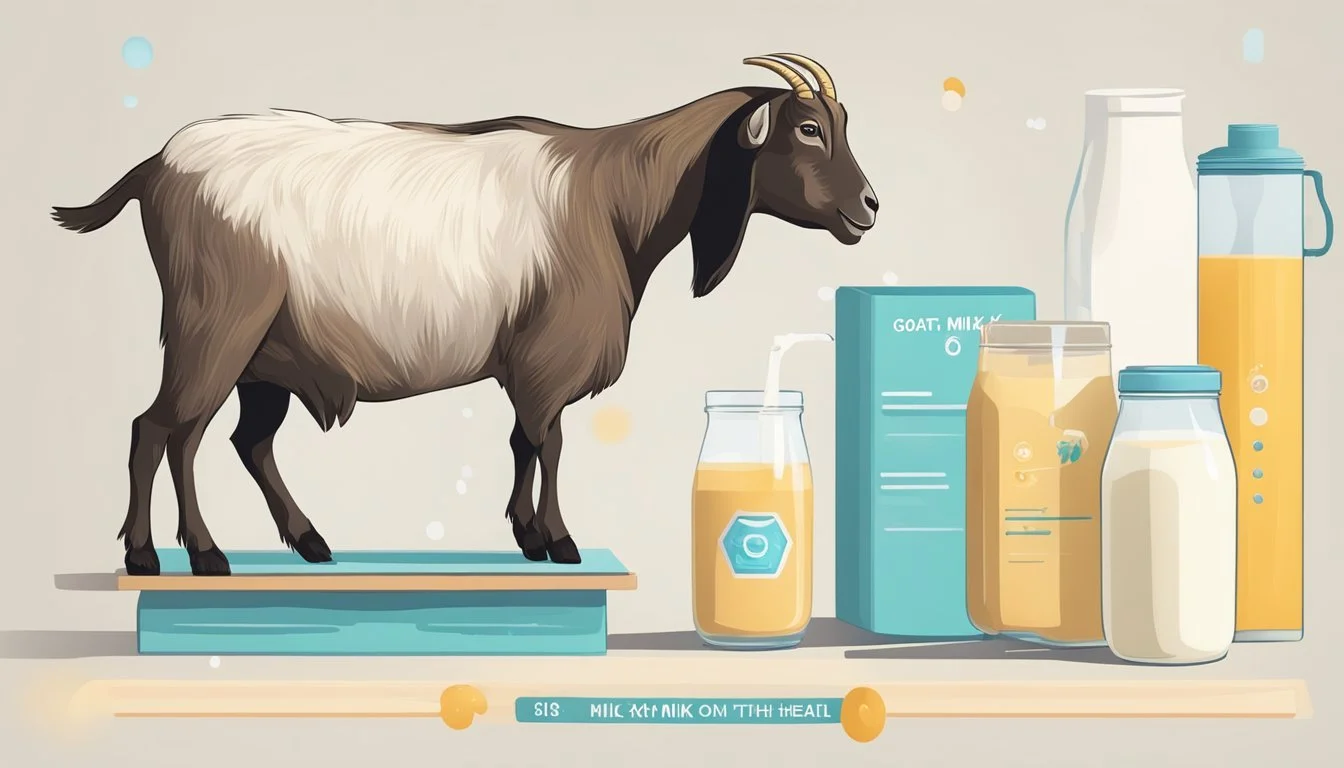The Influence of Goat Milk on Cognitive Health and Development
Insights and Evidence
Cognitive health, encompassing functions such as memory, attention, and problem-solving, is a crucial aspect of overall well-being. Nutrition plays a significant role in the development and maintenance of these cognitive abilities. Among various nutritional sources, goat milk has been recognized for its potential influence on cognitive health and development. Its unique composition, rich in fatty acids and other essential nutrients, is believed to support neural functions and brain health.
Research into the nutritional benefits of goat milk has highlighted its functional properties, such as the presence of omega-3 fatty acids, which are critical for neuronal repair and growth. These components of goat milk are not only essential for maintaining cognitive health in adults but also provide foundational support for brain development in infants. The effects of goat milk on cognitive health expand beyond its nutritional content, as its bioactive components are thought to play a role in neuroprotection and cognitive enhancement.
While goat milk has traditionally been a part of the diet in many cultures, it is gaining interest in scientific circles for its potential to bolster cognitive functions. Studies on animal models have shown promising results, identifying goat milk as a nutritional drink that may support memory and brain growth. Such findings suggest that incorporating goat milk into the human diet could offer a valuable dietary strategy for enhancing cognitive health and supporting brain development from infancy through adulthood.
Nutritional Comparison of Goat Milk and Other Milks
This section provides a detailed nutritional comparison between goat milk and other types of milk, including cow and human milk, highlighting key differences in protein, fatty acids, and mineral content.
Comparative Analysis With Cow Milk
Goat milk contains approximately 4.5% fat, 3.6% protein, and 4.3% lactose, with a total solid content around 13.2%. In contrast, cow milk typically has slightly lower total solids and a different composition of these nutrients. Specifically, goat milk has more casein and minerals, and less lactose compared to cow milk, making it a viable alternative for some individuals with lactose intolerance. Moreover, the smaller fat globules in goat milk may enhance digestibility.
Unique Properties of Goat Milk
Goat milk is not only rich in basic nutrients but also contains various bioactive components. These include nucleotides, taurine, and polyamines, which are significant for nutrition and potentially beneficial for the immune system. Additionally, the fatty acid profile of goat milk, containing medium-chain fatty acids, can be particularly advantageous for easier digestion and metabolic health.
Goat Milk vs Human Milk
Comparing goat milk with human milk, goat milk has higher total protein content; however, it resembles human milk in terms of its nutritional composition, possessing many similar proteins and oligosaccharides. These components are crucial for infant growth and development, though the higher protein and mineral content in goat milk require it to be modified before being suitable as infant formula.
Nutritional Relevance in Infant Formula
Due to its nutritional properties, goat milk is increasingly considered an alternative base for infant formula for infants who are unable to breastfeed and have issues with cow milk-based formulas. The presence of essential vitamins and minerals in goat milk supports various aspects of infants' growth, including cognitive development, although it must be adapted to mimic human milk's composition more closely.
Health Benefits of Goat Milk
Goat milk is a nutritional powerhouse with various components contributing to overall well-being, importantly cognitive health in children and the functioning of the digestive and immune systems.
Cognitive Development in Children
Goat milk contains essential bioactive compounds and short-chain fatty acids beneficial for children's brain development. Research suggests a neuroprotective effect, bolstering cognitive function and supporting healthy growth.
Digestive Health and Goat Milk
The digestibility of goat milk is high due to its unique composition of enzymes and nutrients, which aid the gastrointestinal tract. Fermented goat milk, in particular, shows improved microbial activity, enhancing gut health.
Immunological Advantages
Bioactive components in goat milk reinforce the immune system, aiding in the body's natural defense against infections. Its high levels of oligosaccharides and conjugated linoleic acid contribute to these beneficial effects.
Potential for Allergy Management
Goat milk has been found to have lower allergenicity compared to cow's milk, offering an alternative for managing milk allergies due to its different protein structure and presence of specific enzymes.
Goat Milk and Cardiovascular Health
Rich in conjugated linoleic acid and beneficial fatty acids, goat milk can have a positive impact on cardiovascular health, potentially lowering the risk of cardiovascular disease.
Metabolic and Gastrointestinal Disorders
Nutrients in goat milk, like short-chain fatty acids and bioactive compounds, may help in the management of metabolic diseases and gastrointestinal disorders, promoting better metabolic responses and gastrointestinal function.
Goat Milk in Infant and Child Nutrition
This section explores the role of goat milk as a complementary dietary component for infants, outlining its inherent advantages for growth and development, and discusses its nutritional benefits in children's diets.
Goat Milk as a Dietary Component for Infants
Goat milk has been recognized as a beneficial substitute in cases where breastfeeding is not possible or as a complement to a child's diet due to its valuable composition. Studies have highlighted that goat milk is rich in oligosaccharides, which play a key role in the development of a healthy gastrointestinal tract and can influence the immune system positively.
Compared to cow milk, goat milk is easier to digest and less allergenic due to its unique protein structure. It contains a higher concentration of short and medium chain fatty acids, which can be advantageous for infants who might struggle with digestion or absorption of fats from other milk sources. It is noteworthy that goat milk also supplies significant micronutrients necessary for robust growth in infants.
Goat milk, however, should be used with caution and proper guidance, as it lacks certain nutrients found in breast milk and infant formulas, specifically, adequate levels of ferritin and certain vitamins. Careful fortification and consideration are imperative when incorporating goat milk into an infant's feeding regimen.
Advantages in Children's Diets
Incorporating goat milk into the diets of children can extend several nutritional benefits. The presence of essential micronutrients in goat milk supports the overall growth and development of children. These nutrients include calcium, which is instrumental in bone development, as well as a good balance of other minerals and vitamins.
The oligosaccharides in goat milk may continue to benefit intestinal health, fostering a healthy gut environment and aiding in the maintenance of a robust immune system. Children, who are often exposed to pathogens and allergies, may find goat milk to be a gentle and beneficial dietary component.
Moreover, goat milk presents itself as a viable feeding option for young children especially when intolerance to cow milk is displayed. The nutrient-rich profile of goat milk can contribute positively to a balanced diet, ensuring that children receive a diverse array of nutrients necessary for proper cognitive development and physical growth.
In summary, goat milk can be an invaluable addition to infant and child nutrition, provided that it is appropriately fortified and integrated into their diets, complementing other sources of nourishment as recommended by health professionals.
Comparison of Goat Milk to Other Dairy Products
In assessing the cognitive health impact of dairy, goat milk emerges as a distinct player due to its unique compositional attributes compared to cow milk and other dairy types. This section explores the differences and nutritional profiles that position goat dairy products as a potential functional food in both traditional and modern diets.
Goat Milk vs Cow Milk Products
Goat milk and cow milk are the most common types of milk consumed globally, yet they possess different nutritional profiles. Goat milk typically contains higher levels of medium-chain fatty acids which may contribute to easier digestibility and enhanced lipid metabolism. The protein content of goat milk is similar to cow milk. However, goat milk proteins like casein have shown to produce a softer curd in the stomach, which may benefit individuals with digestive sensitivities. Refer to the functional characteristics of goat milk for more information on this subject.
Goat Dairy in Traditional and Modern Foods
Traditionally, goat milk has been utilized in a variety of forms such as fresh milk, cheese, yogurt, and other dairy products, prized for its nutritional qualities. In modern contexts, goat dairy is gaining recognition as a nutraceutical—an element of functional foods with potential health benefits beyond basic nutrition—preferred for its naturally homogenized fats and its potential anti-inflammatory properties. Find further details on these traditional uses and health benefits in research exploring the health benefits of goat milk.
Nutritional Advantages over Other Dairy Types
Goat milk stands out nutritionally when compared to other dairy products from sources like cow or buffalo milk. It has a comparable or higher density of several essential nutrients, including important fatty acids and vitamins (notably vitamin A and the B vitamin group). One significant advantage of goat milk over other dairy types includes its fatty acids profiles, which are thought to aid in the prevention of cardiovascular diseases. Goat milk is also considered to have a better mineral balance, like calcium and phosphorous, which are crucial for cognitive development and bone health. For a closer look at the comparative nutrient profiling of goat milk, examine the study on Comparative Nutrient Profiling.
Socioeconomic Implications of Goat Milk
The socioeconomic value of goat milk encompasses its role in supporting rural economies, influencing breeding practices for yield optimization, and its utilization in alternative medicine and nutrition sectors.
Impact on Rural Livelihood in Developing Countries
In developing countries, particularly in regions of Africa, goats serve as a cornerstone for the livelihood of rural communities. They are valued not only for meat production but increasingly for the dairy products they provide. A study in the Niger Valley of Benin highlights the critical nutrients goat milk offers, especially for children in food-insecure regions. As a result, the dairy sector is emerging as a conduit for improved nutritional status and economic stability.
Goat Breeding and Milk Yield
Goat breeds differ widely in terms of their milk yield, with some breeds being significantly more productive than others. This variance plays a crucial role in breeding decisions, as higher-yielding breeds can boost a farmer's income through increased milk production. For instance, European and North American goats can yield up to 1600 kg and nearly 2400 kg of milk per annum, respectively, guiding choices in breeding programs to enhance economic returns.
Usage in Alternative Medicine and Nutrition
Beyond its economic value, goat milk is rich in bioactive compounds that contribute to human nutrition and are utilized in alternative medicine. These compounds have been found to enhance brain molecular functions, a testament to the milk's nutrient profile. Incorporating goat milk into diets can thus support cognitive health while also offering an avenue for communities to diversify their income streams through the sale of this high-value product.
Safety and Regulatory Aspects of Goat Milk
When considering the role of goat milk in cognitive health and development, it's crucial to address the safety and regulatory frameworks that govern its production and sale. These frameworks ensure that goat milk is safe to consume and that it meets established quality standards, while also considering potential public health concerns.
Standards and Quality Control
Goat milk production is subject to stringent quality control standards designed to maintain its safety and nutritional value. These standards involve regular testing for contaminants and adherence to hygiene practices during milking and processing. The World Health Organization (WHO) along with local food safety authorities have protocols in place to minimize the risk of infections and to ensure that goat milk only reaches the consumer when it meets safety benchmarks.
Protocols include:
Routine inspection of dairy goats for signs of illness.
Testing for common milk-borne pathogens.
Compliance with pasteurization regulations or recommendation for raw milk products.
Public Health Concerns
When it comes to public health, goat milk consumption raises several points for consideration, specifically in the context of communally susceptible populations like infants or individuals with immune deficiencies.
Allergies: Goat milk is not free from allergenic proteins and, therefore, may still trigger reactions in individuals with milk protein allergies, despite being a different species of milk.
Immunological Development: Studies suggest goat milk could influence immunological development positively due to its protein profile, but care must be taken with infants or those with compromised immune systems.
Physiological Process: The impact of goat milk on physiological processes, such as the prevention of ailments like stomach ulcers and constipation, has been observed, but medical advice should be sought for therapeutic use.
Asthma: While there's no direct link to the alleviation of asthma, some hypothesize alternative milks like goat’s milk may possess properties mitigating inflammatory conditions.
It is essential for producers and consumers alike to remain informed about these aspects to fully benefit from goat milk while mitigating potential health risks.
Future Directions in Goat Milk Research
The coming years in goat milk research are poised to leverage advancements in technology and deepen the understanding of goat milk's impact on cognitive health. Focal areas will include refining processing methods, validating health claims through clinical trials, and exploring innovative products driven by market insights.
Innovations in Goat Milk Processing
Recent advances aim to enhance the bioactive compounds in goat milk, which have shown a positive influence on cognitive function. Researchers are developing novel processing techniques that might maintain the alkalinity and digestibility of goat milk while also increasing the milk yield. These processing innovations have the potential to maximize the therapeutic potential of goat milk.
Clinical Studies and Health Claims Validation
The field is witnessing an upsurge in animal studies and clinical trials focusing on the therapeutic potential of goat milk, including its impact on cognitive health. Validation of health claims through scientific research is critical for the credibility and adoption of goat milk as a functional food. Future studies will likely dissect the roles of specific enzymes and compounds in goat milk and their direct correlation with cognitive development and overall brain health.
Advanced Goat Milk Products and Market Trends
As consumer demand for health-boosting foods rises, the market trends suggest a surge in innovative goat milk products such as cheese fortified with additional bioactives known for supporting cognitive health. The synergy of advanced research and market trends will guide the development of these functional food items. They will aim to cater not only to health-conscious consumers but also to individuals seeking therapeutic dietary options.
Through continual exploration and rigorous examination, each of these areas is set to contribute significantly to the knowledge of goat milk's potential to enhance cognitive health and development.
Conclusion
Goat milk has been studied for its potential benefits in human nutrition and cognitive function. It contains fatty acids that are believed to support neuronal repair and growth. Research suggests that the unique composition of goat milk may have neuroprotective effects, which can be beneficial for memory and brain functions.
In comparative studies, goat milk has displayed functional properties that could influence cognitive health. It is packed with essential nutrients that might play a role in sustaining cognitive processes.
The literature indicates variability in the composition of goat milk, influenced by factors such as breed, diet, and environment. Consequently, it is emphasized that the quality of goat milk can vary, potentially impacting its efficacy in supporting cognitive health.
Continued research is pivotal in further clarifying the extent of goat milk's influence on cognitive development and maintaining cognitive abilities. The growing body of evidence, nonetheless, supports the inclusion of goat milk as part of a dietary strategy aiming at cognitive health enhancement.
While results are promising, the complexity of human cognitive health necessitates cautious interpretation of these findings. Individuals and healthcare providers should consider this when evaluating goat milk's place in nutrition and cognitive health strategies.







